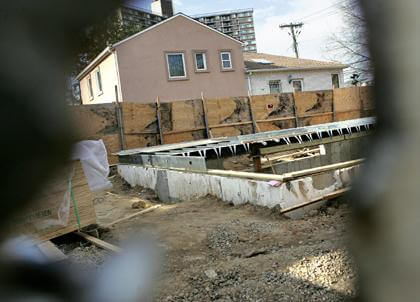By Nathan Duke
Bayside community activists said they were upset to find out the city has allowed a controversial project to develop a Korean church along 210th Street to move forward despite an outcry from neighbors of the property.
The city Department of Buildings has performed an audit of the development, but protests from residents in the neighborhood have yet to sway the city from putting a halt to the church’s construction, said Susan Seinfeld, district manager of Bayside’s Community Board 11.
“The DOB has said they finished the audit and that the project can go ahead as planned,” Seinfeld said.
A DOB spokeswoman said the church’s construction may continue, but it currently has no certificate of occupancy.
The church, which is being built at 26-18 210th St. in Bayside, has riled up residents living along 27th Avenue and 210th Street who say they believe the building will be out of character with the community.
Anthony Naletilic, who put together a group last year called the Bayside Preservation Association for the purpose of fighting the church’s construction, said neighbors of the development are angry the city has not responded to their concerns.
“We submitted zoning objections to the city back in July and they were supposed to get back to us within a month,” he said. “Here it is February and they still haven’t gotten back to us. We’re getting jerked around.”
The association, made up of 17 families near the site, filed a lawsuit in spring 2008 against the developer on the grounds the structure would not comply with the city’s zoning and administrative codes.
The deed for the property lists Kyung Jin and Kwan Ok Chung as its purchasers. A pastor at Flushing’s Jesus Covenant Church said last year the two institutions are interrelated.
City Councilman Dan Halloran (R-Whitestone) said his understanding of the situation was that the mortgage for the property was obtained for a residential home. The property’s developer demolished a house at the site after it underwent a change of occupancy and use in August 2008 and began constructing the church.
Halloran said he believes the developer may have violated the mortgage’s terms and that he was told the property had been put into foreclosure.
A spokesman for Emigrant Mortgage Co., which provided a loan for the church, could not track down information on the property to determine whether it had been foreclosed.
But Frank Skala, president of the East Bayside Homeowners Association, said he does not believe the community will end up facing off against the church’s developer in court.
“They could still win by going to court on the property’s deed restrictions, but that’s an expensive thing to do,” he said. “You’d have to put up a bond.”
Seinfeld said the DOB told her the house of worship would seat less than 100 people and would therefore not have to provide on-site parking.
Reach reporter Nathan Duke by e-mail at nduke@cnglocal.com or by phone at 718-260-4566.

































